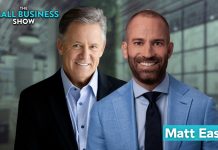We are now well into the first quarter of 2022 and business strategy is at the forefront of most business owners’ minds. On this week’s episode of The Playbook, host Mark Collier, business consultant for the UGA Small Business Development Center, sits down with Lara Hodgson, President and CEO of Now Corp and Co-author of the highly anticipated book, “Level Up: Rise Above the Hidden Forces Holding Your Business Back.” Today, Lara shares insights from her new book and why business owners everywhere should pick it up.
Mark Collier:
Welcome into The Playbook, Lara.
Lara Hodgson:
Thank you so much for having me.
Mark Collier:
Well, I have read your book and I can say it is a fantastic read, full of gems and just knowledge and a lot of things that small business owners are going to really want to read and take to heart.
Lara Hodgson:
Those are the battle scars.
Mark Collier:
I get it. I get it. For those viewers out here don’t know as much about you as I do, kind of share a little bit about your background and your role at Now Corp.
Lara Hodgson:
Yeah. Well, I have a very non-traditional background, but I think many small business owners do.
Mark Collier:
Absolutely.
Lara Hodgson:
If you were to chart my career path, it is not a straight line. It looks like someone spilled spaghetti on a plate. I started out in more of a technical space. I’m an engineer by training, aerospace engineering, it’s good for all the rocket science jokes. And then from there I ended up studying in Japan. I had a real passion for learning about people’s differences.
Mark Collier:
Sure, absolutely.
Lara Hodgson:
And then when I came back to the US, I ended up going to business school and started my career initially doing consulting. Working with lots of different types of businesses which was just great for learning. And then it was when I became a mother that I became an entrepreneur. Stacy and I both like to say that we were somewhat reluctant entrepreneurs. Because we really started a business more out of necessity then out of a lifelong dream to be the boss.
Mark Collier:
Absolutely. Absolutely.
Lara Hodgson:
When I had my son, Stacy and I had met in Leadership Atlanta. And she was also making a career change to run for public office. I was making a career change to be a good mom. And so we looked at each other and said, “What should we do together?” And so our first company was in the consulting space. We just took all of our knowledge from our different backgrounds and started to help other people.
Mark Collier:
That’s very good.
Lara Hodgson:
And then came up with our first idea, our product idea, which was Nourish largely because of my child spilling things in the back of the car. And so we tackled that problem and then as we were growing that business, we faced a new set of challenges, which was not getting paid on time. And so we started NowAccount. And I think the reason my life looks like spaghetti is everything I’ve done came out of a need that I experienced and I just wanted to solve it.
Mark Collier:
Well, the old adage is true, necessity is the mother of all invention.
Lara Hodgson:
It is. It is.
Mark Collier:
That certainly makes perfect sense. Your book, obviously coauthored by someone who I think we know, Stacy Abrams.
Lara Hodgson:
We all know.
Mark Collier:
It on both the Financial Times and Fortune Magazine five most read books for February. Let’s talk about the vision for writing the book. And I know all authors, they have a vision when they write a book. What was your vision for writing this book?
Lara Hodgson:
Stacy and I have such a unique business partnership because we’ve been through failures and successes. And a lot of partnerships don’t survive one business, much less survive a failure and then another business. And so, we’ve both been very busy in our own lives, obviously Stacy with her policy work and political work and me trying to grow the business. And this was just a year ago we sat down and said, “Wow, we’ve had such an interesting path. We’ve learned a lot, but I think more importantly, the lessons we’ve learned have never been more important to share than they are right now.”
Mark Collier:
Absolutely.
Lara Hodgson:
For two reasons, one, we’ve got a world in which we’re all sort of coming through, hopefully this pandemic phase, moving into more of an endemic phase. But businesses are being started faster than ever before.
Mark Collier:
Correct, they are.
Lara Hodgson:
And if we don’t share our lessons now, then more of them will never scale and that would be an opportunity missed. I think that was one. The second thing is we just recognize this kind of feeling in the world right now, which is really separating people. I see it in the way my child is being taught. I just see people pulling away from diversity and sort of retrenching in their own comfort zone. And I find that sad because I think what makes life amazingly rich and what makes innovation possible is when you bring people together that are different.
Mark Collier:
Fully agree.
Lara Hodgson:
And so that was really our vision, is we said, “My gosh, now’s the time to share these lessons because we didn’t learn them just for ourselves.” When we see a problem, we don’t want to just solve the problem for ourself, we want to solve it for everyone that comes behind us.
Mark Collier:
That makes perfect sense.
Lara Hodgson:
And so now is the time, I want all those businesses that are coming out of the pandemic and starting, to have a better chance of scaling than ever before.
Mark Collier:
Well, that makes perfect sense. And I’ll tell you, you’ve seen the numbers like I have in terms of business starts, they’ve just exploded.
Lara Hodgson:
Exploded.
Mark Collier:
Since the pandemic, so you’re absolutely right. If businesses and they’re hungry for resources, they’re hungry for just knowledge that’s going to help propel them forward and keep them in business because you’ve also seen those statistics on the number of businesses that go out of business.
Lara Hodgson:
Well, that’s what I was going to say. It’s ironic that at a time when more businesses are being started than ever before, experts would tell you that we’re in an entrepreneurship crisis in the United States. And at first you scratch your head and say, “Well, how is it a crisis? More businesses are being started.” But the reason it’s a crisis is that the majority of those are not businesses, they’re jobs. Someone is starting a job for themself that will never scale enough to create jobs for the economy, hire employees and create that generational wealth that moves the economy up. I would say there’s an entrepreneurship crisis on the horizon but we can head it off if we act now.
Mark Collier:
There you go. I love it. I love it. The title of the book, Level Up: Rise Above the Hidden Forces Holding Your Business Back. That title grabs you. What was the story behind that?
Lara Hodgson:
We had this mental image in our mind, the level up part was that we wanted to help businesses scale. And I think a lot of people focus their attention on the startup phase. There’s shows like Shark Tank, et cetera. But what most people don’t realize is, it’s probably never been easier to start a business. Good Lord, I can with just a few pennies to rub together, I can build an app.
Mark Collier:
You sure can. You sure can.
Lara Hodgson:
But it’s never been harder to scale a business. And it is more complicated than ever to find channels, distribution, partnerships. It’s so complicated. At the same time, so we had this idea of focusing on the scale piece, which was kind of level up. But we also recognize that if you have a seesaw, there’s two ways to level something and we wanted to bridge the gap between underrepresented businesses, small businesses and large businesses, which quite frankly, the pandemic has increased the gap between the haves and the have not.
Mark Collier:
It has been exacerbated.
Lara Hodgson:
And so when you about leveling a playing field, you can either take the top and bring them down or you can take those that are lacking and bring them up. And we always want to be bringing people up. The goal is not to bring people down. But the second part of it, rise above the hidden forces, when Stacy and I sat down and started to look at the things we’d learned, the places we’d failed, what we recognized is that there were two types of obstacles. There were obstacles that we created ourself, which we all do. We don’t know it but we create our own obstacles.
Mark Collier:
Yes we do.
Lara Hodgson:
And those were things we could solve. But then quite frankly, there were obstacles that were bigger than us. And you don’t want to acknowledge those obstacles for the purpose of creating a victim mentality because that doesn’t help anybody. But you want to acknowledge them because A, if you know you’re there, you have a better chance of navigating them. And B, we want the book to really be a call to action, that if small businesses can band together, we can change the systemic challenges.
Mark Collier:
Absolutely. Absolutely.
Lara Hodgson:
But we can’t each do it by ourself. We have to work together.
Mark Collier:
Now you mention systemic challenges and for minority and women owned businesses, those are endemic challenges. They really are. They are across the board and they’re persistent and consistent. Some of the advice and tools that you give within your book will help businesses, as you said, level up and rise above those challenges. As you were writing through the book, what part of the book did you have the hardest time writing?
Lara Hodgson:
Gosh, the hardest thing was going back and telling some of the really painful stories. I lived it all over again. I lost sleep some nights worrying about stuff that happened three years ago, which I guess we do all still have that dream that you missed a class in college and you missed a test but it was a little bit like PTSD.
Mark Collier:
I can imagine.
Lara Hodgson:
That we had navigated those challenges, we had come through, we survived. To go back and live them again was hard. It was probably also therapeutic and good to look at it again, but we could have glazed over it. And some of the reviews have said that, we could have just said, “Oh, we had this challenge.” But we really wanted to share what we were feeling when we went through it because entrepreneurship is so lonely.
Mark Collier:
It is, it’s a lonely journey.
Lara Hodgson:
And when anything goes wrong, your first reaction, is I messed up. And so we share the time that I sat in the car and cried. I cried a lot in that book, but it was important for people to know A, you’re not alone. Other people have been through it. But more importantly, you can go through it and in your darkest hour, the sun will still rise tomorrow.
Mark Collier:
Absolutely.
Lara Hodgson:
And so just knowing that you will survive, is what helps get people through.
Mark Collier:
Makes sense.
Lara Hodgson:
That was really hard for me to go through it again.
Mark Collier:
No, know that makes sense. And sharing those difficult stories, I’m sure many entrepreneurs out there can relate with, if not some of them, all of them. And there’s another old adage that I like to say, oftentimes you learn more from your failures than you do your successes.
Lara Hodgson:
Absolutely. Absolutely.
Mark Collier:
That’s another story though.
Lara Hodgson:
Well, and a lot of those failures, if you step up at a high level, if Nourish hadn’t failed, we wouldn’t have discovered the opportunity for NowAccount.
Mark Collier:
Absolutely. Absolutely.
Lara Hodgson:
The failure was…
Mark Collier:
It was a springboard.
Lara Hodgson:
I often say you don’t just say failure’s acceptable. Failure’s awesome. Failure should be encouraged. You should try to fail sometimes. And I know that seems odd, but if you can fail fast and fail forward, A, it’s not as painful, the sooner you fail. The problem is human nature is try to resist failure and it’ll still come and it’ll be epic. The first time you see it, if you can embrace it and say, “Oh, we had a failure, what are we going to do?” And you see that through the book, you see some of our small failures that we addressed quickly and then you see times where we didn’t catch it fast enough and it was much bigger.
Mark Collier:
Oh, absolutely. No, that may makes sense. And oftentimes failure it’s when you encounter the failures and you overcome them, there’s a sense of accomplishment there. It makes you stronger. It makes you stronger as an entrepreneur.
Lara Hodgson:
I truly believe, and my son thinks this is an inconvenient truth that I remind him of, that the confidence you get from winning is fleeting.
Mark Collier:
Yes. It is.
Lara Hodgson:
You won the game, now what are you going to do next week? But the confidence you get from hitting rock bottom and coming back, that’s forever. It never goes away.
Mark Collier:
Not only the confidence, but it builds that strength, the inner fortitude.
Lara Hodgson:
The grit.
Mark Collier:
The grit. The grit, I like that.
Lara Hodgson:
Which I think we all have learned through the last two years.
Mark Collier:
Oh, absolutely.
Lara Hodgson:
If there’s one thing I’ve gained from the pandemic is this vision or this view that, bring it on. There’s really nothing I can’t tackle now.
Mark Collier:
Absolutely.
Lara Hodgson:
And that is a gift that I’ll carry with me for the rest of my life, even when we’re not going through the challenges of a pandemic and social unrest. That’s probably a skill we all could use earlier in our life.
Mark Collier:
Absolutely. I love it. Flip side of the coin, we talked about the most difficult part of the book, now what was the most fun part of the book to write?
Lara Hodgson:
I think there were two parts that were the most fun for me. One was reconnecting on a personal level with the sort of story of mine and Stacy’s friendship. Because a lot of times when you’re in it, you take it for granted. And when you step back and say, “Wow, we met in 2004, we were two very different people but we came together and built sort of a mutual respect that allows our differences to be our superpower.” Being able to go back and sort of look at our friendship and how it evolved over time and how we did get through tough times that would’ve broken up most business partnerships, how we’ve both been able to pursue our life’s passion and still support each other, that was kind of fun for me because I had never stepped back and studied it. And then the second part was in the book, we feature other entrepreneurs that we’ve met along the way. And to me, they are the heroes of our economy.
Mark Collier:
Yes, they are.
Lara Hodgson:
And in many cases, these are people that we had worked with for years but I hadn’t fully appreciated the depth of their personal story that got them there. The book was a way for us to really sit down and learn their backstory, which made me even more in awe of them.
Mark Collier:
All right. Let’s talk about what lessons would you like your readers to come away with from reading this book? Let’s talk a little bit about that.
Lara Hodgson:
Every chapter has a set of lessons. But I think there’s some overarching ones. Certainly one of the ones we introduce very early on is that difference is our superpower. And I think that applies at every level of your life. That’s not just about your business. But especially in your business, I think that most of us as humans, we try to build diverse teams. We all intellectually know that a diverse team performs better. We know that. But inherently, when we start to build that team, we start to build a team that reflects ourselves. And so reminding ourself that we should seek out the person that is the mirror opposite of us, even though it’s uncomfortable. Because it’s going to introduce discomfort into the team dynamics. But that discomfort makes us all better. And so I think reminding people that as you’re building your team, constantly be evaluating. I look at NowAccount and on one hand, I’m so proud of the fact that our team is 50% women, 50% minority, we are the true definition of diversity,
Mark Collier:
Diversity, equity.
Lara Hodgson:
But I do think there’s times when people say, “Oh, you’re a woman in business, you should have all women.” And I’m like, “Well, that’s not diverse.”
Mark Collier:
No, that’s not diverse. No, absolutely.
Lara Hodgson:
That’s not any more diverse than a team of all men. Sometimes in our zest for diversity, we almost go too far and then we end up without the true diversity.
Mark Collier:
Absolutely.
Lara Hodgson:
I also think that within NowAccount, even though at a macro level we have this beautiful diversity, I still all the time have to look at the subteams. Because I’ve got some subgroups within the company that are all women or all minority or all, and I’m like, well, wait a minute. Even though at the surface, we’re incredibly diverse, we got to make sure we crosspollinate that all throughout the organization.
Mark Collier:
Absolutely.
Lara Hodgson:
And you’re never done. That’s something you have to work on every single day.
Mark Collier:
Every single day.
Lara Hodgson:
And really thinking about the diversity that we can see, but the diversity of thought.
Mark Collier:
I love it. I love it.
Lara Hodgson:
That’s the hard part. And I will tell you what most large organizations mess up, is they may do a great job of hiring diverse thinkers and then they train it out of them. Because think about the organizations you join and then all of a sudden they’re like, this is the way we do things. This is the way we do things. Well, you just got rid of all the diversity, because you’re telling people how to think.
Mark Collier:
Ain’t never going to grow.
Lara Hodgson:
And that’s not good.
Mark Collier:
Laura Hodgson, author of Level Up, co-author, Rise Above the Hidden Forces That are Holding Your Business Back. I would encourage all business owners to run, not walk to go out and purchase this book because it is full of gems and business lessons that will help propel them forward. I thank you very much for coming in today.
Lara Hodgson:
Thank you.
The Atlanta Small Business Network, from start-up to success, we are your go-to resource for small business news, expert advice, information, and event coverage.
While you’re here, don’t forget to subscribe to our email newsletter for all the latest business news know-how from Atlanta Small Business Network.







